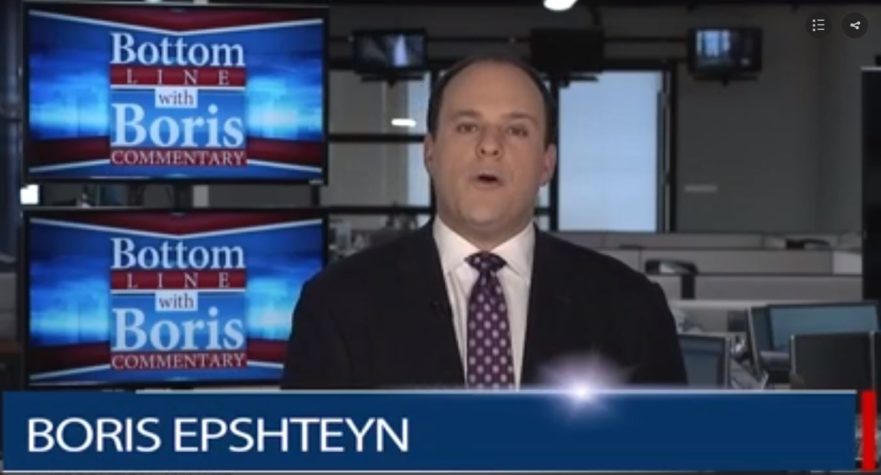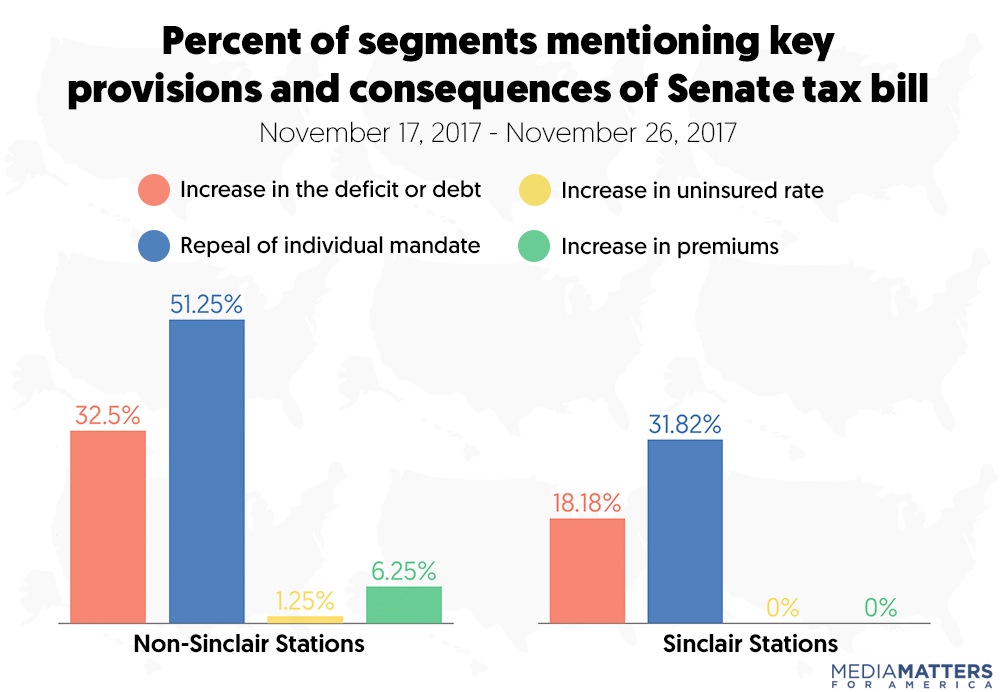In 2017, Bank of New York Mellon (BK) spent $320,000 on lobbying that included pursuit of the tax cuts ultimately passed in December, lobbying disclosure forms show. Bank of New York Mellon, also known as BNY Mellon, ramped up its tax lobbying in the fourth quarter, as the tax battle heated up.
At the same time, one study found, TV news coverage of the debate over tax cuts was being slanted toward the tax bill. That coverage was most slanted, according to the study, at TV stations run by Sinclair Broadcast Group (SBGI). The single biggest investor in Sinclair is BNY Mellon, which owns almost ten percent of Sinclair.
The study, by the progressive watchdog group Media Matters, found that coverage by 20 local stations in five markets—Portland, Maine; Phoenix, Ariz.; Nashville, Tenn.; Madison, Wis.; and Anchorage, Alaska—often failed to mention unpopular provisions of the tax bill. Among those local stations, the four Sinclair stations skewed even further in the bill’s favor.
Media Matters found, for instance, that non-Sinclair stations mentioned the tax bill’s negative impact on the deficit or debt in 32.5 percent of reports airing from November 17 through November 26 last year. Sinclair stations addressed that issue in just 18.2 percent of their segments on the tax bill. Non-Sinclair stations mentioned in 6.3 percent of their reports that the tax bill’s repeal of the individual mandate for health insurance could increase customer premiums. Sinclair stations in the study never informed their viewers that premiums could increase.
A cursory online search turned up several video commentaries in favor of the tax bill from Sinclair Chief Political Analyst Boris Epshteyn, a former adviser to the Trump campaign and the White House. Epshteyn posted video commentaries advocating for the tax bill on September 14, November 17, and December 15, just four days before the final votes. One commentary that dismissed Democratic criticisms of the bill as purely political was posted online by Sinclair stations in Washington, D.C.; Albany, N.Y.; and San Antonio, Texas. Epshteyn’s commentaries reportedly are mandatory for all 193 Sinclair stations to air.
BNY Mellon has more than doubled its ownership stake in Sinclair over the last two years. At the beginning of 2016, BNY Mellon held 3.6 million Sinclair shares. That increased to 5.8 million by December of 2016. Last year, BNY added to its Sinclair holdings in each of the first three quarters, owning a peak of 7.89 million shares as it headed into the fourth quarter. Only in the fourth quarter, the same quarter the tax bill passed, did BNY Mellon reduce its stake slightly.
The date of that fourth-quarter sale is not reflected in SEC filings, and BNY Mellon’s first-quarter activity for this year is not yet publicly available. As of December 31, 2017, BNY Mellon owned 7.55 million of Sinclair’s 76 million total shares, still the company’s largest shareholder.
BNY Mellon in the last quarter of 2017 recorded $427 million in benefits related to the new tax bill. The company also said its effective tax rate would drop as a result, from 25 percent in 2017 to 21 percent this year. Sinclair’s other biggest owners are other financial institutions, which also stood to benefit from the tax bill.
Sinclair’s journalistic integrity was defended this week by President Trump, after CNN reported that Sinclair anchors were forced to read identical on-air statements bashing other media, and Deadspin obtained and compiled those statements into a video that was widely shared and seen by millions.
Sinclair’s integrity has been challenged on previous occasions, most recently by the Federal Communications Commission. Chaired by a Trump appointee, the FCC in December fined Sinclair $13 million for failing to disclose content it aired as part of a paid sponsorship.
In 2005, Sinclair aired interviews conducted by Armstrong Williams that were favorable to the Bush Administration’s No Child Left Behind educational initiative. It was later revealed that Williams had been paid $240,000 by the Bush Department of Education to advocate for the program. Unlike other media outlets, Sinclair declined to cut its ties with Williams after the compromising payments were revealed.
After 9/11, Sinclair executives ordered local anchors to pledge on-air that they stood behind President Bush. The company followed that in 2004 by launching an effort to report “good” stories out of Iraq.
Jonathan Larsen is the managing editor of The Young Turks. Follow him on Twitter.
Don’t miss exclusive news stories from The Young Turks: Follow TYT Investigates on Twitter, Facebook, and YouTube.


